Planet Coaster: hands-on with Frontier's theme park sim
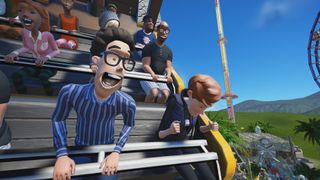
Planet Coaster is the spiritual successor to RollerCoaster Tycoon, that beloved series of theme park simulators. The basic premise hasn’t changed much—build a park, fill it with rides, keep the punters happy—but now there are many extra layers of complexity. The simulation is richer the creation tools are more powerful.
“I worked on the RollerCoaster Tycoon series, and I always wanted to do more with it,” says Jonny Watts, chief creative officer at Frontier Developments. “I’m really into simulation and creativity, and Planet Coaster is a combination of both. Whatever you create also feeds into the simulation.”
Watts also thinks this is the perfect time to revive the theme park simulation genre. “The success of games like Prison Architect and Cities: Skylines has shown that there’s a commercial reason for making Planet Coaster too.”
The goal of any park in Planet Coaster is to keep your visitors happy. You do this by creating exciting rides, catering to their needs (whether it’s a burger or an easily accessible toilet), and making your park look attractive. You do so using a robust suite of creation tools that offer an impressive amount of freedom.
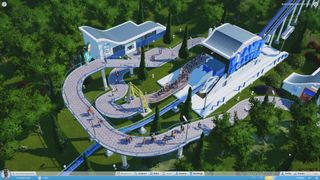
You aren’t just snapping parts together like a Lego set: you can combine objects, splice them together, resize them, and do pretty much anything to ensure your park looks unique. But the option to snap to a grid is there if you need a hand.
“We’re giving you more tools than ever,” says Watts. “As well as the building parts there are decorations, which will give people’s creations even more flavour. You can build things off grid. Even the path system is exciting. You can have curved paths!”
That sounds like a minor addition, but theme park sim fans who’ve always been constrained by grid-like path placement will be overjoyed by its inclusion. I test it for myself, building a snaking network of paths around the rides in a pre-made park one of the devs created. I’m playing a pre-alpha build, but it works brilliantly.
The biggest gaming news, reviews and hardware deals
Keep up to date with the most important stories and the best deals, as picked by the PC Gamer team.
“We’re trying to get that balance between the creation tools being powerful and accessible,” says Watts.” Our design philosophy is nested complexity. It’s very easy to start building something, but if you want to achieve something more advanced, you have to start digging. When you’re building a coaster you can have it snap nicely to a grid, but at any time you can disable it and create a track at any angle.”
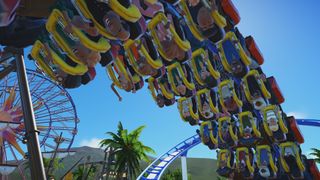
“A lot of things have keyboard modifiers. When you’re laying a path, you can hold control to disable the auto-complete. This lets you create unique shapes like spirals. You don’t have to do this, but it makes the tools so much more powerful.”
As the title suggests, it’s the rollercoasters that are the real stars of Planet Coaster, and the track creation tools reflect this. You can choose from a wealth of preset parts, but also fine-tune every segment to a remarkable degree. You can accurately recreate any real-world coaster, or create something totally crazy.
One of the coolest features I’m shown is being able to have a coaster go underground. With a few simple clicks the track digs into the ground, creating a tunnel. Then they use the terrain tool to dig around it, creating ‘windows’ in the rock to watch the coaster through as it speeds along. These constructions not only look cool, but the people riding the coaster will be more excited by them as well.
And, as is tradition with games like these, you can click on any ride you build—whether it’s a coaster or a so-called ‘flat ride’ like a drop tower—and view the action through the eyes of the shrieking guests. The parks are brilliantly alive, and I spend some time flying the camera around looking at people milling around and mascots waddling along in oversized costumes. You’ll be able to click on any visitor to and see what they’re thinking, which will let you know the strengths and weaknesses of your park.
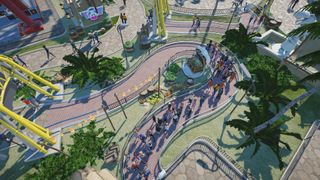
I notice that the game’s main menu is a globe covered in icons. Watts says this is the game’s hub where you’ll access your own parks, as well as other people’s creations. “There’s a reason for it being called Planet Coaster,” he says. “With the planet you see when you load the game you’ll be able to download coasters and parks built by the experts. But you’ll see friends, friends of friends, top picks, and your own stuff.”
Much like Frontier’s other big game, space sim Elite Dangerous, Planet Coaster will be released as an alpha first. Players will be able to pre-order and get an early glimpse of the finished product. It’s a model that worked brilliantly with Elite, and Frontier is expecting similar things for this game. “We’ll be listening to the community,” says Watts. “And hopefully they’ll be a barometer of how well we’re doing. But we’re also making this game for ourselves, because we’re fans of the genre.”
The team making Planet Coaster is made up of ex-RollerCoaster Tycoon devs, as well as a slew of new talent fresh from university. “We have the enthusiasm and the knowledge of the people who developed the RollerCoaster Tycoon games,” says Watts. “But we also have a lot of new people too. New graduates who played it when they were younger and who can keep us old guys on our toes.”
The full release of Planet Coaster is a way off, but they’re off to a tremendous start. The build I played was solid and creating buildings with the new creation tools hinted at the immense possibilities. When it’s released, the community is going to make some mind-blowing stuff—something Frontier is understandably excited about.
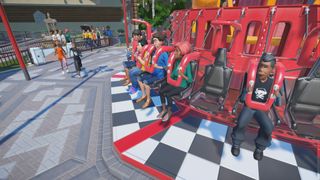
“There’s a lot of depth,” says Watts. “We want to get it out there and have people play it for hours to see if there’s anything making it unenjoyable. Some of the things that are frustrating in the first 30 minutes actually improve the long-term experience. Placing lights by hand might seem fiddly, but it gives you a lot of freedom.”
I see an example of this when Frontier loads up a park made by a developer, centred around an enormous tree created with the terrain tool. It’s covered in spirals of lights, all hand-placed, and it looks amazing. You aren’t limited to regular theme parks in Planet Coaster: if you imagine it, you can probably build it.
A game like this will thrive on being accessible, and Frontier is making sure the game scales well for a variety of PCs. “We’re pushing a lot of polygons,” says Watts. “If you’ve got a powerful PC, the game will look great. But if you have a less powerful one, certain elements will automatically reduce in quality to make sure it runs well.”
Planet Coaster is shaping up nicely, and I can already tell it’s going to be one of those games that spawns a passionate, creative community. Once people get their hands on these tools, you’re going to see some wild stuff. But there’s also the simulation side to look forward to: managing your park, keeping people happy. Frontier is taking the classic theme park sim and boldly modernising it.
If it’s set in space, Andy will probably write about it. He loves sci-fi, adventure games, taking screenshots, Twin Peaks, weird sims, Alien: Isolation, and anything with a good story.
Most Popular


